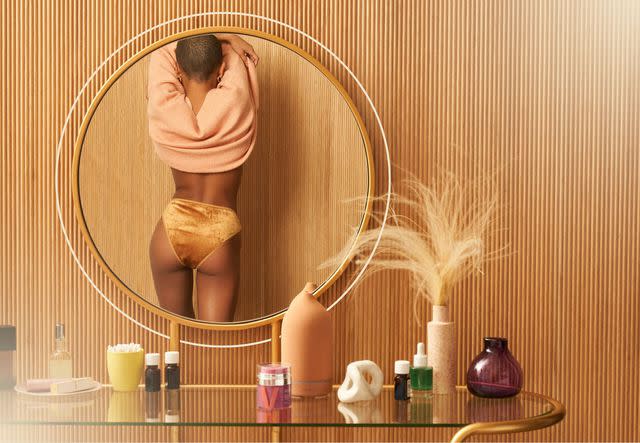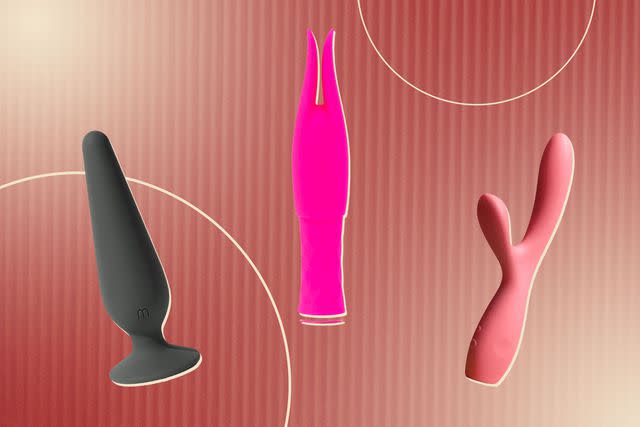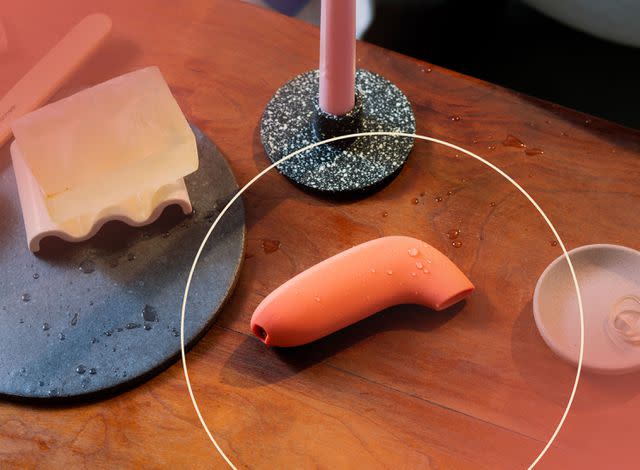You’re About to See More Vibrators On Store Shelves — and That’s a Great Thing
- Oops!Something went wrong.Please try again later.
As department stores launch and expand their sexual wellness offerings, prioritizing female pleasure becomes less taboo.

Courtesy Vella
Face masks, bath bombs, lipstick — lube? One of these is not like the others, but slowly, retail is beginning to group them into the same category.
The term “self-care” took center stage during the ongoing COVID-19 pandemic as everyone scrambled to deal with isolation and heightened stress. Face masks, aromatherapy, fluffy robes, and meditation apps became regular characters in our weekly routines. Now, mainstream self-care is increasingly including sexual wellness in the mix.
A quick search on sites such as Sephora, Nordstrom, and Saks Fifth Avenue will lead you to a diverse range of libido-boosting supplements, waterproof vibrators, and organic lube. Typically, they’re found under the “bath and body” or “wellness” categories — a careful marketing strategy that mindfully rebrands the once-taboo products found exclusively at sex shops through revamped word choice, packaging, and curation — to feel more welcoming, inclusive, and shame-free.
This evolution of self-care should come as no surprise. We’re amid a sexual revolution where people are encouraged to have conversations surrounding previously stigmatized subjects. Thanks to social media, they’re happening out in the open.

Courtesy Vella
Rachel Wright, MA, LMFT, a licensed therapist specializing in sex and relationships, says that despite being regulated and censored on various apps, the content still impacts views surrounding sexual wellness. “When we see things constantly, it helps normalize things. It’s positive desensitization,” she explains.
The normalization of sexual health and pleasure has led to an uptick in demand and sales. In 2021, people spent $19 billion on sex toys (twice as much as in 2016), and according to a recent Global Sex Toys Industry Report, the sexual wellness market is expected to grow to $54.6 billion by 2026.
Even a casual shopper running errands can see this growth. Walmart introduced sex toys and enhancers into its stores in 2018. Since then, other mass retailers such as Target and CVS, followed suit. In 2021, Nordstrom launched its sexual wellness category and in 2022, Sephora, Ulta Beauty, and Saks hopped on board. Neiman Marcus's anticipated pilot program will run later this year, although it already sells vibrators, condoms, massage candles, and lubes from sexual wellness brand Maude on its site. (The latter has been a leader in the aesthetic rebrand of sexual pleasure and wellness.)
For Ulta Beauty, the move to integrate sexual wellness products into its online and in-store offerings was prompted by both the sales projections in the category and an eagerness of its customers. “We responded to these evolving needs by creating a category dedicated to sexual health products that help guests address physical, mental, and social well-being connected to their intimate life,” confirms Penny Coy, VP of Merchandising at Ulta Beauty.
It’s about time the Goopification of wellness shifted. After all, there are records of people using sex toys that predated the wheel and they’re even referenced in the Bible (Ezekiel 16:17). Even the World Health Organization defines sexual health as a “state of physical, emotional, mental, and social well-being in relation to sexuality.” Research shows sexual well-being is linked to increased health and happiness, and it’s also a tool for empowerment.
Generally speaking, women are made to feel like their needs should be secondary to others — and that’s a cultural truth that expands far beyond sex.
However, until relatively recently, female pleasure has been put on the back burner. It wasn’t until 1974 that the first women-founded sex boutique in the world launched. Women started to find empowerment through their sexuality, and by the time the vibrator episode of Sex and the City premiered in 1998, a brave few began saying the quiet part out loud. But on the whole, female pleasure has continued to be a punchline (a certain famous “faking it” scene comes to mind) or a nice extra, versus the focus of partnered hetero sex.
“Generally speaking, women are made to feel like their needs should be secondary to others — and that’s a cultural truth that expands far beyond sex, but sex is a huge component of that,” says Gina Gutierrez, president, chief creative officer, and co-founder of audio erotica app Dipsea. “Helping people to understand that putting themselves first in terms of understanding themselves, stating what they need, and what they don't want is such a powerful phenomenon. When people are more sexually empowered, they become more empowered in every other aspect of their lives.”
This societal shift in our relationship to our sexual selves is happening as women spearhead new sex-positive brands. “This category has been dominated by male founders,” says Éva Goicochea, founder and CEO of Maude. “I'm all for gender inclusivity, but why are men making brands for women and making money off of it?”
She’s onto something — research from McKinsey highlights that “when inventors set out to solve a health problem, male inventors are more likely to solve for a male-oriented condition; women-led teams solve for both.” Thankfully, there’s a growing number of female-led sexual wellness and health brands spearheading the self-pleasure revolution. (Jems, Dame, Crave, Bloomi, Bedroom Kandi, and Unbound, to name a few.)
A recent State of Sex Report from telehealth company hims & hers found that half of America fantasizes about sexual activities they would never do in real life, nearly half (47%) fake orgasms, and a third have a sex toy that no one else knows about. What’s more, over one quarter of men (28%) and half (50%) of non-binary people say it’s difficult or impossible for them to orgasm during penetrative sex, and 36% of women say they have a difficult time reaching an orgasm without the help of a sex toy or masturbation.
Discovering what you want in bed and finding ways to communicate that can be difficult when nobody around you is having those conversations, and unfortunately many people are still uncomfortable talking about it. “It’s human nature to want to blend in — most people want to go with the majority. And when it's ingrained in us through our parents, friends, TV shows, movies, and society that it’s unacceptable to talk about sex and pleasure, it starts to just become a belief,” explains Wright. Thankfully, culture is shifting, and as such, people are increasingly openly talking about these topics. “Individual expression has a domino effect,” she adds.

Courtesy
Television, pop culture, and social media have had a huge influence on bringing awareness toward sexual wellness and female desire. Four weeks following the release of Netflix’s Sex/Life, the streaming platform reported that the show was watched by 67 million households — a testament to the heightened interest in female exploration and pleasure. And let’s consider Call Her Daddy, a Spotify-exclusive podcast by Alex Cooper that focuses on sex and relationships. It’s the most listened to podcast by women on the platform with an estimated 5 million listeners per episode. This means people are making sexual conversations a part of their everyday. Any business executive will tell you their spending habits will follow.
Celebrity brands, endorsements, and partnerships also help. When Goop launched its first vibrator in 2021, celebrities such as Kim Kardashian and Demi Lovato proudly supported Gwyneth Paltrow’s launch on their social media channels. In 2020, Maude appointed 50 Shades of Grey actress Dakota Johnson as co-creative director and launched an FDA-grade silicone anal plug the following year. Similarly, Cara Delevingne was the co-founder and creative advisor for now-defunct sex tech startup Lora DiCarlo; Lily Allen is an ambassador for Womanizer, and Lovato created their own gender-neutral vibrator available exclusively at Bellesa Boutique.
Celebrities aside, there are more than a handful of new and exciting sexual wellness brands popping up at all price points. Brands such as Queen V, The Honey Pot, and Cake are at the forefront of mass market retailers; at the masstige level, Maude, Dame, and Smile Makers take center stage; and at more of a luxe price range, Goop, LELO, and Vella are among the most popular brands.
Retail opportunities for both start-ups and more established direct-to-consumer brands look optimistic as projections soar and department stores strategize how to remain relevant to consumers post-pandemic. Apart from online offerings and in-store activations, approaches such as subscription boxes have proved to be an effective strategy to increase sales. Just take Steam Box, for example: the company pairs sexy romance books with vibrators every quarter, tapping into the evergreen and growing audience to provide a holistic experience. (The romance genre sold $47 million in 2021 alone.) And while there are department stores that proudly showcase 10-inch dildos next to gua shas and bath salts, others are taking a more conservative approach as they test the waters — Ulta Beauty being one of them.
“While Ulta is an inclusive destination for everyone to discover new possibilities, we understand that we have younger guests shopping in our stores and not all are seeking this category,” explains Coy on the retailer’s decision to keep devices off the shelves and online-only.
However, Wright argues that exposure to these types of products at a young age can help normalize them in the same way they view a body lotion — and that’s a good thing. “People are so afraid that if we talk about pleasure that [kids and teenagers] are going to do things at a younger age, and the reality is that people are going to do things when they want to do them,” she adds, pointing to studies that show there are higher rates of pregnancy where abstinence is taught versus where safer sex practices are.

Courtesy Dame
What becomes obvious when observing the offerings available at popular department stores is that they’re tailored to a wide range of demographics. While shoppers for devices tend to skew younger — typically millennials and older Gen Z — there’s an older demographic that often is ignored but has untapped spending power valued at roughly $15 trillion: women who are 50+.
As menopause becomes less of a taboo subject, sex in post-menopausal women is also becoming normalized. As such, brands are popping up left and right. This uptick in menopause-focused brands is a sign to retailers of what’s to come, and in turn, they’re betting that “menopositivity” will be the next big thing in the sexual wellness space — just take Naomi Watts’ brand Stripes as an example. Additionally, Coy shares that Ulta Beauty will be doubling its in-store assortment of Womaness, a high-performance collection of modern menopause products. That’s smart, especially considering the 1.3 million women in the United States enter menopause every year, the 64 million women in post-menopausal age in the country, and the $600 billion business opportunity.
Wright believes that the integration and normalization of sexual wellness products should have happened years ago, but is glad there’s a shift happening toward prioritizing women and non-binary people now. “The idea that penis owners can masturbate with lotion and they can just borrow their parents' lotion — they don't need anything!” she says of the historical disparity. “A lot of women don't use a vibrator because they don't know how to get one.”
This normalization of sex toys, accessories, and conversations surrounding pleasure has led to increased awareness and education — and it’s changing how people live. The feedback these brands have received from customers illustrates the life-changing effects sexual empowerment has on their lives. Gutierrez says they’ve heard feedback on how their listeners have learned to overcome sexual trauma (which affects one of every six American women) and access joy again by re-entering sexual experiences through Dipsea’s expansive audio erotica library. Not to mention, she says it has helped them figure out their preferences, whether that be sexual orientation or learning to verbalize and communicate what they want.
Similarly, Goicochea mentions that customers have reported that Maude helped them discover and rediscover pleasure. “Hopefully, people will be able to recognize that [sex] is not something to be ashamed of, and that the more empowered they are to understand their bodies and health, the more they get to make good decisions for themselves,” she adds, nodding to the trickle-down effect the normalization of sexual representation has.
“It's been exciting to see the department store-ification of these sorts of physical products. I think it’s a huge component of people saying, ‘Hey, pleasure is actually a really important, everyday part of your life and you deserve it,’” says Gutierrez — we couldn’t agree more.
For more InStyle news, make sure to sign up for our newsletter!
Read the original article on InStyle.

